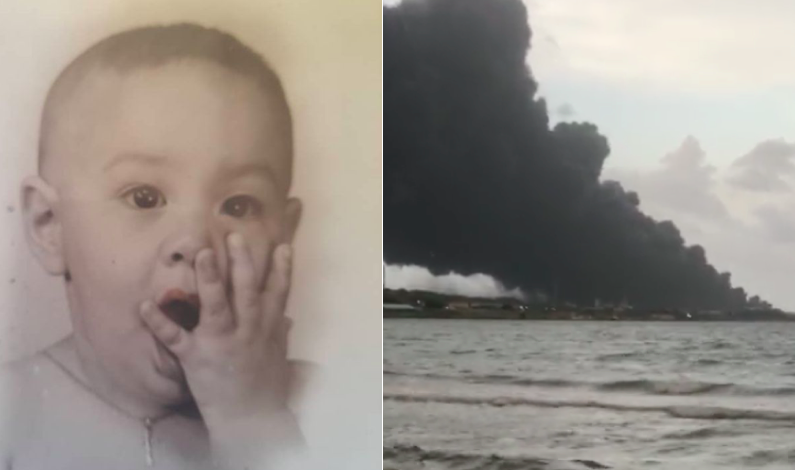HAVANA, Cuba.- That astonished little face you see in the photo is mine, when I was not yet my first year. I think the author of the photo was Celestino, or perhaps Tirso, who was Celestino’s son. They were the most renowned photographers in the town where I was born, perhaps the only ones. My elders used to say that when a frightened child cried in front of the camera, the photographers who were my neighbors sought my presence in the studio.
And all they wanted was for me to pose in front of the camera so that the crying boy would lose his fear of the hulk that was that camera raised on huge legs and with the lens fixed on the crying boy’s face. And that photo that I choose, that little face, is from those years, and without a doubt it is the one I like the most. I love looking at myself with my hand over my mouth and my fingers so open. Without a doubt, the photographer wanted to connote the expression of astonishment of that child that I was so long ago.
And if I expose it now it is because an event in national life made me feel that image in the Turkish chair, and also because I cannot, rather I do not want, to get out of that astonishment that they made me a victim. And the culprit is a certain Yoerkis, one of those many boys who belong to that generation that Yoani Sánchez baptized as “Generation Y”. It turns out that Yoerkis, a journalist for an official media outlet whose name I don’t remember, or don’t want to remember, makes us note some verses that assure that Fidel was in Matanzas.
And the only thing missing in such desperate moments is the resurrection of Fidel Castro and his return to life. The delusional saw him serene, he saw him resolved, he looked at him erect, and even moved embracing a family. And I, poor mortal, could not do anything but cross my fingers, ride one on top of the other so that the dream would not come true, rather the delirium, rather the imbalance of seeing his return, his return, his coming, in short , the resurrection of the one he hated so much, of the one who denied the resurrection of Christ, and his return.
And they say they saw him in the “super tanker”, and also with the firefighter. Some looked at him with their own eyes, coordinating alliances, reviewing plans, and surely pointing with their index finger to the impeccable, clean and oval nail, which made them believe that they had just had a manicure. They saw the thin fingers that never held a machete, at least not beyond the moment of the photo. And surely they also looked at him at the moment in which he hugged the son of the disappeared person, his wife and his mother, promising that they would lack nothing, that he would give them everything, and more. Fidel would make each dead person a hero, and he would name a school, a hospital, even the burn service of a hospital on the island after him.
Sadly, Fidel would use every dead person. And I couldn’t see Fidel, and I couldn’t even imagine him with the lens of hundreds of cameras on me, I didn’t feel the shot of the camera, nor the light from the flashes. I did not see Fidel, because he was not there, because he will never be, and also because I avoid even assuming him in those places of disaster: always asking and asking, promising and promising, and forgetting and forgetting, and without fulfilling what He was promising so much. I did not see Fidel in Matanzas dictating in the ear of Díaz-Canel, nor recriminating him, nor taking advantage of that little encounter to remind him of his foolishness in believing that lemonade is the basis of everything. I only remember an old and emaciated Fidel Castro, sick, and wearing Adidas clothes and a Rolex GMT-Master.
When the memory is inevitable for me, I see him creating the UMAP, I remember him giving the order to shoot down the tugboat March 13 or promising ten million tons of sugar, without his complying, and what is worse, I remember his destruction of the sugar industry and the rice and veguera industries. And I blame him for the fact that today I am writing this text that I should have written yesterday or the day before yesterday, but because of him, because of his great fault, I spent the whole day without electricity, and the charge that my PC had was barely enough for a few lines.
I write without the cup of coffee next to me, despite the “Havana cordon”, I write thinking about the last bitter coffee I drank, because the ten million tons of sugar were never made. I write waiting for another twelve-hour blackout and the immense heat that exhausts and dehydrates. I write thinking about what I’m going to cook, and about the huge queue to buy what I’m going to put on the fire, that fire that suddenly slips away, that vanishes and leaves me with half-cooked food, and I feel hungry, and I harass hate.
And I think again of August 13. As I finish these lines it is still August 13, but readers will no longer see this text on the most convenient date, because I had a twelve-hour blackout and it is very difficult to write in the dark, and under a swarm of mosquitoes that could get very soon have dengue, and all because of that man who would be having his birthday this weekend, and whom they celebrate even if he is dead, and buried. And I hope that without the right to resurrection.
And just when he was ready to close this text, Cándido Palmero appears on television to talk about his beloved boss. That Cándido Palmero appears who presided over the Blas Roca contingent, that contingent that caused so much blow after the “maleconazo”, that insurrection of that August 5 that we remember only a few days ago. And there was Fidel, and he looked with those eyes that have already swallowed the earth or the fire that turned him into ashes. Fidel was there, and it is most likely that Raúl Torres will assure him soon in one of those songs that are yet to come.
And it is probable that they violate the work of Martí, that they ensure that some butterfly looked at Fidel from its rosebush, among the rubble and rescuing the lifeless bodies, the burned bodies, the debris of those bodies. It is almost certain that the delusional will see him there, risking his life, wanting to get on a supertanker, with the same force with which he descended, and before a camera, from a tank in Girón, because that is the latest Cuban history when it comes to Fidel. A story full of delusions, a story in which the events do not matter much and the “heroes” do, a story where the content does not matter, but the continent does. This is how false the history that the communists make.
OPINION ARTICLE
The opinions expressed in this article are the sole responsibility of the issuer and do not necessarily represent the opinion of CubaNet.
Receive information from CubaNet on your cell phone through WhatsApp. Send us a message with the word “CUBA” on the phone +1 (786) 316-2072, You can also subscribe to our electronic newsletter by giving click here.






